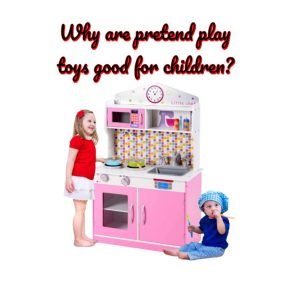Why are pretend play toys good for children?

The Power of Pretend Play: Nurturing Children’s Growth Through Imagination
Children, with their boundless energy and curiosity, navigate the world around them in unique ways. One significant aspect of their development is often overlooked—pretend play. Are pretend play toys good for children’s growth? Let’s explore the magical realm of make-believe and its profound impact on our little ones.
Pretend Play Toys for Kids Growth
are beneficial for children because they allow children to use their imagination and creativity, develop social and emotional skills, practice problem-solving and decision-making, and learn about the world around them. Pretend play can also help children develop language skills, as they often use verbal communication while playing. Additionally, pretend play can be used as a tool to teach children about different roles and responsibilities, such as being a doctor or a teacher. Overall, pretend play toys are a great way to support children’s cognitive, social, and emotional development.
Understanding Pretend Play: More Than Just Fun
Pretend play is a cornerstone of childhood. It involves children using their imaginations to create scenarios, characters, and narratives, often imitating real-life situations. This type of play encompasses activities like playing house, doctor, or pretending to be their favorite superheroes.
Beyond the surface level of enjoyment, pretend play is a powerful tool for children’s cognitive, social, and emotional development. Let’s delve into the various ways in which these imaginative experiences contribute to their overall growth.
1. Cognitive Development: Building a Foundation for Learning
Pretend play toys engage a child’s mind in ways that traditional learning may not. When a child pretends to be a teacher, they are not just playing but creating a mini-universe where they are in charge. This process involves problem-solving, creativity, and critical thinking. The child learns to navigate a scenario, make decisions, and understand cause and effect, laying a foundation for future learning endeavors.
2. Language Skills: A Playful Path to Communication Mastery
Immersing children in pretend play situations provides them with opportunities to express themselves verbally. Whether negotiating roles in a make-believe game or creating dialogues for their imagined characters, children naturally enhance their language skills. This process improves vocabulary and hones communication and social interaction abilities, preparing them for effective communication in various contexts.
3. Emotional Regulation: Managing Feelings Through Play
Pretend play toys are a safe space for children to explore and understand their emotions. When they take on different roles, they experience a range of feelings—joy, frustration, excitement, and empathy. This emotional exploration within the confines of play helps children learn to manage and express their emotions healthily, contributing to emotional intelligence development.
4. Social Skills: Learning Through Cooperative Play
Pretend play toys like boys’ toys, girls’ toys, toy cars, plane toys, and toy trucks often involve interaction with peers, siblings, or parents. This collaborative aspect of make-believe scenarios teaches children valuable social skills. They learn to take turns, share ideas, negotiate roles, and work together towards a common goal. These social interactions in a pretend play setting lay the groundwork for successful relationships in the future.
5. Creativity and Imagination: Fostering a Lifelong Love for Learning
Pretend play is a canvas for creativity. When children engage in imaginative scenarios, they tap into their creative reservoirs, fostering a love for exploration and learning. This creativity extends beyond the playroom, influencing their approach to problem-solving and innovation in various aspects of life.
Choosing the Right Pretend Play Toys
Now that we’ve uncovered the myriad benefits of pretend play, selecting suitable toys becomes crucial. Opting for toys that encourage open-ended play, such as dolls, action figures, play kitchens, or costumes, can enhance the pretend play experience.
In answer to the question, “Are pretend play toys good for children’s growth?” the resounding answer is yes. Pretend play is not just a form of entertainment; it’s a dynamic tool that nurtures cognitive, social, and emotional development. As parents, educators, and caregivers, we play a crucial role in fostering an environment where children can explore the enchanting world of make-believe, unlocking the full spectrum of their potential for growth and learning. So, let the imagination soar, and watch your child’s development take flight through the magic of pretend play.


